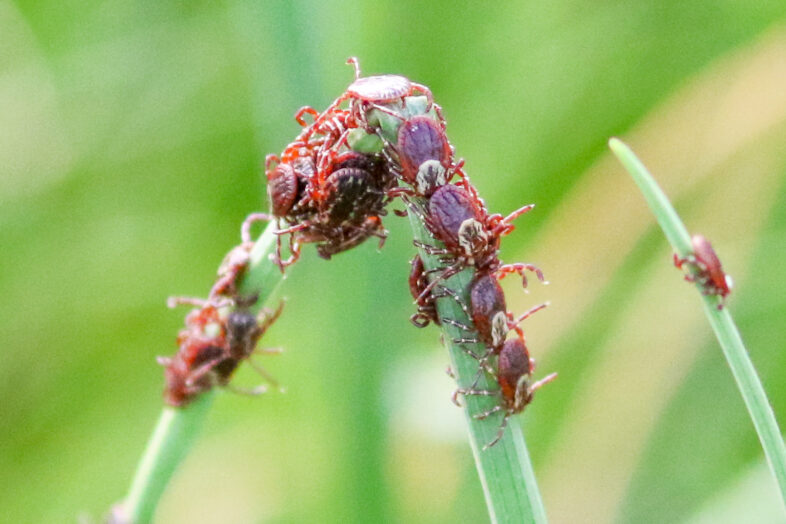
American Dog Ticks. © Brendan Burke, some rights reserved (CC-BY-NC). https://www.inaturalist.org/observations/83084643
October 2024 update: Phew! We made it through another season, and we will not miss being covered in ticks or finding ticks after work crawling in our cars or on our bedroom walls. 😉 We surveyed 175 properties in the Upper Valley from April through August in 2024, and we can’t wait to complete the full analysis of the data. Stay tuned.
Our research goal is to understand if commercially-applied tick chemical control measures have unintended consequences for beneficial insect communities and pollinators. In 2023, we surveyed over 70 properties, walked 19 miles of transects searching for ticks across folks’ backyards, counted and identified >9000 non-tick invertebrates (e.g., spiders, beetles and moths), and found 140 ticks (black-legged and American dog ticks combined). This year, 2024, will likely be the final year of the study before we publish our results.
Who can participate? Anyone in or adjacent to the Upper Valley of New Hampshire and Vermont that has a regularly-mowed grassy lawn (No-Mow May folks are welcome to participate as well). For logistical efficiency, we’re particularly interested in folks who live within ~20 minutes of Hartford, VT. We’re looking for residential or commercial properties to serve as Control (those that are not sprayed for ticks) and as Treatment (those that you have commercially sprayed/fogged/misted for ticks with either traditional pesticides or essential oils) properties. We’ve had a hard time reaching property owners that have their lawns treated with traditional chemicals (e.g., permethrin), so please help spread the word to these folks.
If I’m a Treatment property, do you spray for ticks and who pays for it? We (the biologists) do not spray for ticks or pay for the tick control services. Our study is simply piggy-backing on the existing pest control services (if any) that you pay for on your own property.
If I’m a Treatment property, do I need to coordinate with the spraying company to hold off or to adjust the timing of their visits? No. In fact, please do not do that. That would create a lot of logistical challenges for the spraying companies, and we don’t want to influence what you have sprayed or when you have it sprayed this summer. Just let us know when you hear from the spraying company about their next planned visit, and we’ll try to be there shortly before they spray. Most Treatment properties have their lawns sprayed multiple times each year. So if we can’t squeeze in our surveys before their next spraying visit, we’ll just wait for them to return again.
When will you survey and what do you do during the surveys? If you’re a Control property we will conduct two surveys about 4 days apart. If you’re a Treatment property we will coordinate with you to survey 1-2 days before you have your yard treated for ticks, and we’ll survey again 1-2 days after the chemicals are applied. On each visit, we’ll conduct standardized tick surveys by dragging a white cloth across different sections of your mowed lawn and around the lawn edge. We will sample non-tick invertebrates (e.g., spiders, snails, and insects) from the shrubs and tress along the edge of your lawn using a standardized sampling method known as beat sheeting. Beat sheeting is non-lethal–all non-tick invertebrates are immediately released unharmed after we rapidly identify them. We will collect all the ticks to take with us for identification back in the lab. Surveys take approximately 30-minutes, you’re welcome to join us during the surveys if you want, and we will not harm your plants or sample in your garden. There is no need to pick up toys or chairs in the lawn before we come visit. We will begin in early May and conduct surveys throughout July, possibly into August.
Why should I participate? Because science is cool(!), plus we’ll tell you how many and what species of ticks you have on your property. As an Open Science organization, we’ll share all of our raw* and analyzed data with you at the end of our study, so that you can make informed decisions about future tick control measures on your property. *Note: no personally identifiable information (e.g., who you are, where you live, or what chemicals are applied to your property) will be shared.
Why don’t you survey forests or other habitats outside of my lawn? Professional tick control companies largely focus on treating the mowed lawns around homes and businesses, and not the natural habitat outside of the lawn. We are interested in understanding if these tick control measures have unintended consequences for pollinators, and therefore we are sampling insects in the areas that are directly sprayed or immediately adjacent to sprayed areas.
Ok, I’m convinced! What do I do again? Sit back and relax. We have completed our 2024 field season, and we will not be collecting any more field data for this project. You’re welcome to reach out to Dr. Jason Hill () to learn more about our project. Thank you.
